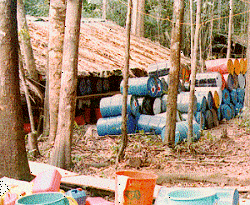Focus on Territorial Disputes: Western Sahara
By Emily Green
Staff Writer
The Western Sahara, a region south of Morocco bordered by Algeria and Mauritania, is home to the Sahrawi people, a predominantly Muslim ethnic group.
Although the territory was once a Spanish colony, Morocco has asserted control over the region since 1975, when 350,000 Moroccans crossed the border to lay claim to the Western Sahara.
Acting out against the annexation, the Sahrawi-led Polisario Front initiated a guerrilla campaign against the Moroccans, resulting in a fierce conflict. The fighting continued until 1985, when the U.N. Secretary-General introduced “settlement proposals” for a peaceful resolution. Under the U.N. proposal, the United Nations Mission for the Referendum in Western Sahara (MINURSO) was created in 1991 to facilitate a referendum for Sahrawi self-determination.
Before the referendum was held, a ceasefire needed to come into effect to trigger a transitional period. Although both the Polisario Front and the Moroccans agreed upon a date in September 1991, implementation of the ceasefire was delayed and hostilities were revived after a two-year period of peace. Seeking to restore stability, MINURSO deployed military observers, effectively switching the mission’s goal from brokering a referendum to monitoring the ceasefire.
Although the ceasefire has largely held, little progress has been made towards establishing an environment conducive to the referendum, in spite of renewed negotiations between the parties in 2008, 2009, and 2010.
On March 5, U.N. Secretary-General Ban Ki-moon traveled to the disputed territory to meet with Polisario Front leaders. Ban noted the parties’ lack of progress towards a last political solution and spoke out against the “unacceptable situation,” which he characterized as “one of the forgotten humanitarian tragedies of our times,” according to the UN. The Western Sahara, commonly referred to as “Africa’s last colony,” is home to some of the oldest refugee camps in the world, used to hold Sahrawi people.
In retaliation, the Moroccan government issued a statement on March 8 accusing Ban of “dropping his neutrality and impartiality” to support “a puppet state.”
Although Ban’s spokesman was quick to dismiss the claims, tens of thousands of Moroccans took to the streets in protest on March 13, waving Moroccan flags and chanting, “The Sahara is ours, the King is ours.” According to Fortune Magazine, the rally sought to “tell Ban and the world that the Sahara is a red line” for the Moroccan people, as one protester stated.

